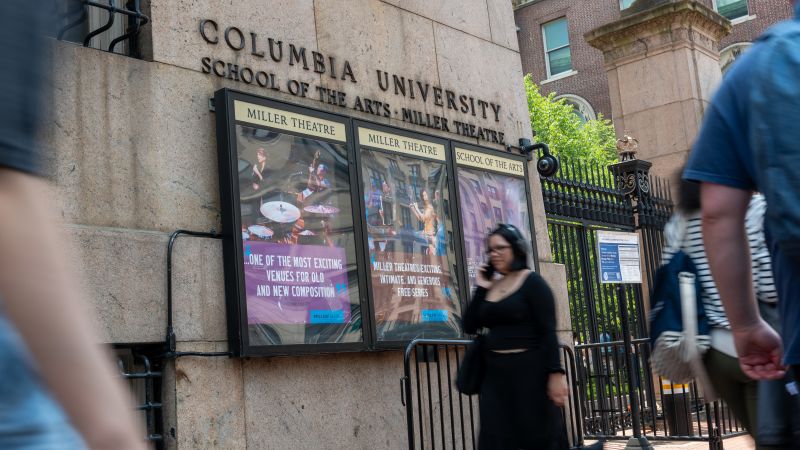House Republican Leadership Chairwoman Elise Stefanik has raised concerns over comments made by Columbia University’s acting president, Claire Shipman, suggesting they may violate the Civil Rights Act. Stefanik, alongside GOP Representative Tim Walberg, highlighted Shipman’s call for an Arab individual to be appointed to the university’s board, amidst ongoing investigations into the institution’s handling of antisemitism.
In a letter addressed to Shipman on Tuesday, Stefanik and Walberg referenced a message dated January 17, 2024, where Shipman, then chair of Columbia’s board of trustees, stated the need to “get somebody from the middle east [sic] or who is Arab on our board,” urging urgency with “Quickly I think. Somehow.” The congress members questioned this approach, emphasizing that appointing someone based on national origin could contravene Title VI of the Civil Rights Act, which prohibits discrimination in federally funded programs.
Allegations of Antisemitism and Board Dynamics
The letter further scrutinized Shipman’s remarks about Jewish board member Shoshana Shendelman, described as one of the board’s “most outspoken members against the bullying, harassment, and intimidation of Jewish students.” Shipman reportedly commented on January 25, 2024, “I just don’t think she should be on the board,” raising questions about her stance during a period of heightened antisemitism on campus.
Columbia University, in response, stated that these communications, shared with the committee in fall 2024, are being misrepresented and reflect a challenging period for the university. A spokesperson affirmed, “Columbia is deeply committed to combating antisemitism and working with the federal government on this very serious issue.”
Context of the Allegations
The controversy occurs against a backdrop of significant scrutiny from the Trump administration, which has accused numerous U.S. universities of tolerating antisemitism. Columbia has been a focal point, with allegations of “deliberate indifference” towards harassment of Jewish students since October 2023. This led to the administration canceling $400 million in federal funding in March over campus protests.
Efforts to address these issues have included restrictions on demonstrations, new disciplinary procedures, and a review of the Middle East curriculum. However, the U.S. Department of Education’s Office for Civil Rights recently declared that Columbia does not meet accreditation standards due to its failure to protect Jewish students.
Historical and Legal Implications
The situation at Columbia is reminiscent of past legal battles over university policies and civil rights. Title VI of the Civil Rights Act has been a critical tool in ensuring nondiscrimination in educational institutions. The ongoing investigations and legal challenges underscore the complexities universities face in balancing diversity and inclusivity with federal compliance.
Experts note that the implications of these allegations extend beyond Columbia, potentially affecting federal funding and accreditation for other institutions. This case highlights the broader national debate on campus free speech and the protection of minority groups.
“Your description—that people feel ‘somehow’ betrayed and that this is ‘not necessarily a rational feeling,’ but that it is ‘threatening’—is perplexing, considering the violence and harassment against Jewish and Israeli students already occurring on Columbia’s campus at the time,” Stefanik and Walberg wrote.
Looking Ahead
The outcome of this dispute could set precedents for how universities nationwide address similar issues. As Columbia continues to navigate these challenges, it remains engaged in discussions with the Joint Task Force to Combat Antisemitism, aiming to create a safer environment for all students.
Observers will be watching closely to see how Columbia’s policies evolve and whether they can satisfy both federal requirements and the expectations of their diverse student body. The situation serves as a crucial test of institutional leadership and the effectiveness of federal oversight in educational settings.
 Dalai Lama Confirms Continuation of Spiritual Lineage Amidst Political Tensions
Dalai Lama Confirms Continuation of Spiritual Lineage Amidst Political Tensions Jury Deliberations Continue in Sean “Diddy” Combs Trial Amid Racketeering Dispute
Jury Deliberations Continue in Sean “Diddy” Combs Trial Amid Racketeering Dispute Fiji Rejects Chinese Military Base Amid Pacific Power Struggle
Fiji Rejects Chinese Military Base Amid Pacific Power Struggle Shocking Revelations of Mass Deaths in Syrian Prison Near Damascus
Shocking Revelations of Mass Deaths in Syrian Prison Near Damascus Shocking Revelations: Mass Executions in Syrian Prison Uncovered
Shocking Revelations: Mass Executions in Syrian Prison Uncovered